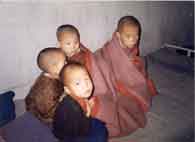 Millions of North Koreans face "real hardship" this winter due to cuts in food aid from foreign donors, the U.N.'s food agency said Monday, as the country sank further into isolation after its claimed nuclear test.
Millions of North Koreans face "real hardship" this winter due to cuts in food aid from foreign donors, the U.N.'s food agency said Monday, as the country sank further into isolation after its claimed nuclear test.U.N. Security Council sanctions imposed after Pyongyang's purported nuclear test last week don't apply to food aid, which the impoverished country has relied on to feed its people for more than a decade. But South Korea, a key donor, stopped aid after the North fired a series of missiles in July, and supplies from China, the North's main foreign food donor, are one-third of last year's levels, said Mike Huggins, a WFP spokesman who just returned from a five-day visit to North Korea.
The aid shortages come on top of the North's decision to accept less food from the World Food Program. A decision that means about 4 million people fewer are being fed this year, Huggins said.
At this time of year, fruit and vegetables "are not available to the poorest people, and they become more reliant on food aid," Huggins said in Beijing. "If that food aid is not there, then there is going to be very real hardship." North Korea's grain harvests should show a shortfall of about 800,000 tons this year. WFP will donate about 75,000 tons, or less than 10 percent of the shortfall.
Huggins said children, mothers, the elderly and the infirm were at greatest risk. Some 37 percent of North Korea's children are malnourished and one-third of mothers are malnourished and anemic, he said. Huggins said those figures were likely to "look even more alarming" if more aid is not delivered soon.
The North has needed foreign donations to feed its 23 million people since its state-run farm system collapsed in the mid-1990s following the loss of Soviet subsidies.
[AP]
No comments:
Post a Comment